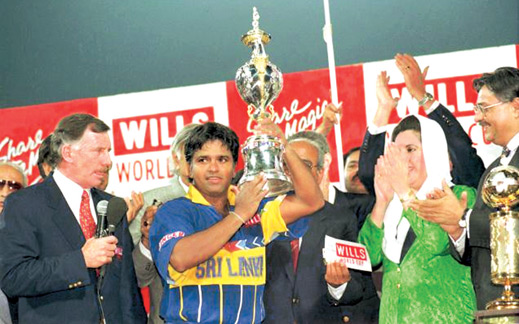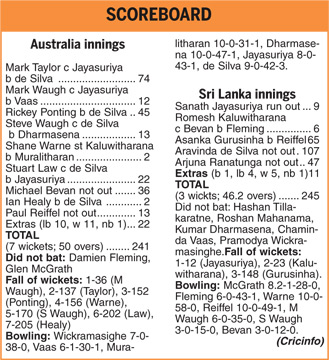When Sri Lanka beat Australia to win 1996 World Cup
FLASHBACK: Contrary to most expectations, Sri Lanka controlled their
first World Cup final after the initial stages. Their batting was vastly
more proficient against spin than Australia's, their catching was
flawless whereas the Australians held one chance out of five; their
ground fielding was sure while the Australians frequently fumbled; and
their spinners obtained enough turn on what was otherwise a batsman's
pitch to stifle the Australians after their confident start fell off.
Australia made 241 for 7 50 overs and Sri Lanka made 245 for 3 wickets
in 46.2 overs in the game at Lahore, Pakistan.
|

Sri Lanka skiper Arjuna Ranatunga holds aloft the Wills
World Cup having received it from the Pakistan
Prime Minister Benazir Bhutto at the award ceremony. |
The first day/night international in Pakistan was played in cool
conditions, and there was no sun even in daytime. Storms the previous
night were followed by rain just as Prime Minister Benazir Bhutto
presented the Wills World Cup to Arjuna Ranatunga, one of the longest
survivors among contemporary Test cricketers.
In spite of the dampness, the Australians would have batted first in
any event, but Ranatunga chose to field first in the hope of some early
wickets for his seamers, and because his batsmen had shown exceptional
maturity of temperament in their earlier run-chases.
If his plan did not work out exactly - the hitherto impressive Vaas
pitching too short - his seamers did succeed in removing Australia's
best player of spin, Mark Waugh, who clipped a half-volley to square
leg.
But the significance of his dismissal was not apparent while Taylor
and Ponting took the score to 137 by the 27th over.
Then Taylor was caught sweeping at de Silva, who began his various
contributions with a spell of five overs for two wickets and 19 runs.
Four overs later Ponting missed his cut at an off-break, which left
Australia without a settled batsman to take on the four spinners as they
tightened their grip.
The balance shifted, and Australia's incoming batsmen were unable to
work the ball through the gaps in the infield often enough, let alone
score boundaries. After 20 overs their score was 110 for one, after 40
overs 178 for five. From the 24th over to their 49th, they did not reach
the boundary except for a pulled six by Law.
Whereas Taylor hit eight fours and a six, his team-mates mustered
just five fours between them, as Ranatunga shrewdly kept his three
off-spinners and Jayasuriya going until the end.
Given the excellence of Sri Lanka's batting, the Australians had to
take early wickets and catch everything. By the sixth over they did have
two wickets, Jayasuriya run out by the narrowest of margins on a TV
replay, and Kaluwitharana mis-pulling to square leg. That, however, was
the extent of Australia's catching: Law dropped Gurusinha when 53 off a
straightforward pull to deep midwicket, and three half-chances were not
taken.
 Considerable dew made the ball slippery, especially for the spinners
Warne and Mark Waugh, and the Australians seemed to have little left in
their tank for their third high-intensity game in seven days. Considerable dew made the ball slippery, especially for the spinners
Warne and Mark Waugh, and the Australians seemed to have little left in
their tank for their third high-intensity game in seven days.
Gurusinha flat-batted Warne for four to long-on and for six over
long-off from consecutive balls, and provided steadily accelerating
support for de Silva, who began with a model on-drive for three first
ball, and whipped Fleming's straight slower ball in front of square to
give Sri Lanka's innings a momentum it never lost.
In mid-innings he was content to push the spinners around and hit
only the bad ball hard, and he made sure of his wicket, after Gurusinha
was out to a wild swing and while Ranatunga was playing himself in. Sri
Lanka won the toss and decided to put Australia in, banking on their top
order to make a successful chase Just as the required rate was climbing
towards a run a ball, Mark Waugh conceded 12 runs from an over, so Sri
Lanka needed just 51 off their last ten overs, which became a mere ten
from five. de Silva went on to score the third hundred in a World Cup
final (after Clive Lloyd and Viv Richards), and finished with 107 from
124 balls, including 13 fours, a remarkable strike rate given his
certainty of application.
It was the first time in six attempts that a side batting second had
won the World Cup final. While a light-hearted crowd favoured Sri Lanka
throughout, no malice was directed towards the Australians, worried
though they had been about repercussions from the Salim Malik affair. A
well-lit and well-staged match was enjoyed by considerably more than the
official capacity of 23,826 spectators. |

